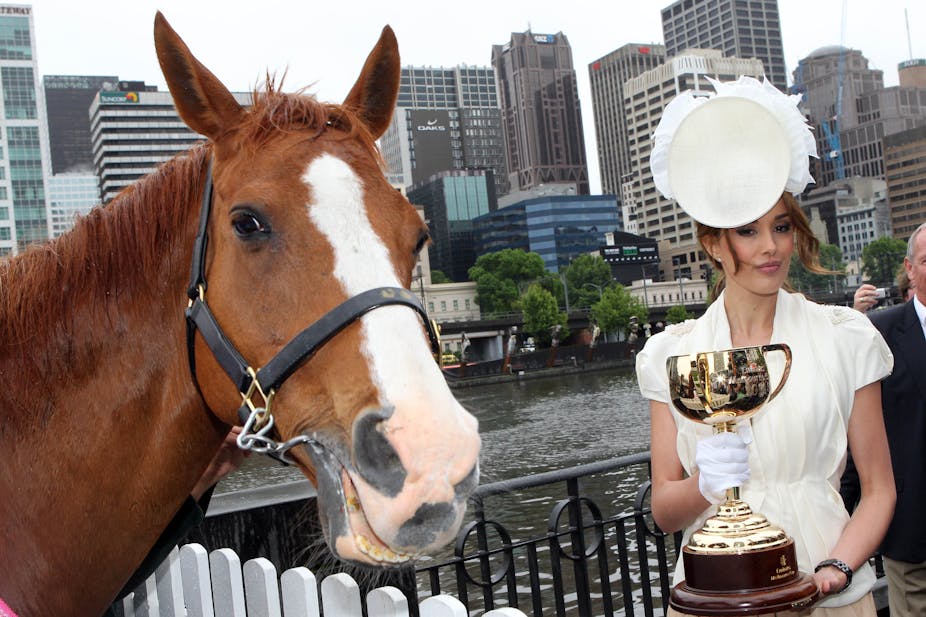In the lead up to the 2011 Melbourne Cup I have heard numerous interviews with Australian racing legend Bart Cummings. Apparently Cummings has “won the Melbourne Cup race a record 12 times”. I had no idea Bart Cummings could run so fast!
The way we talk about the Melbourne Cup is indicative of the problematic nature of horse racing. The horses do most of the hard work and the humans get all the rewards.
That is not to suggest that Bart Cummings does not rise early or that he has not worked hard. But it should give us pause to think about the so called “sport of kings” from the horses’ perspective.
Jockeys reading this article might feel that they too are not given their just deserts. The media focuses predominantly on trainers by claiming – contrary to all other sporting etiquette – that the person who trained the winner was in fact the winner.
While jockeys would probably be justified in feeling that way, the situation they occupy also gives us an insight into the disempowered life of a race horse.
In early 2011, jockeys in Queensland were in a pay dispute with the Queensland Racehorse Owners’ Association. As is typical in such cases the jockeys wanted a larger share of the wealth generated by racing.
More recently, the Australian Jockeys’ Association mooted industrial action, concerned about low government contributions to the National Jockeys’ Trust. The National Jockeys’ Trust provides financial support to jockeys injured while riding, or to their families, in the case of a fatality.
Jockeys are undervalued, but horses get an even worse deal. What mechanisms are in place to protect horses who succumb while competing? The short answer is “none”.

While clearly it makes no sense for race horses to be drawing a salary of their own they could, at the very least, be better remunerated for the hard work they do. For that remuneration to be fair, from an animal welfare perspective, it would have to be applied to all race horses, not just the few who win a prestigious event such as the Melbourne Cup.
When a horse falls on the race track a vet is called. If the prognosis is bad a screen is erected and a shot rings out.
That kind of death raises its own ethical issues. But to my mind, what is more controversial are the countless racing horse deaths that occur each year not to spare the animal pain; not because it is in the animal’s best interest; not because there are no other alternatives; but because the horse was not fast enough, not placid enough, or not likely to ever return a profit to his or her owner.
For every 1000 horses bred by the Australian racing industry only 300 will ever race. In 1991, an estimated 7,500 failed race horses were killed and processed for pet food.
In the racing industry the phenomenon is referred to as “wastage”. It occurs simply because allowing an uncompetitive race horse to live is a cost, and those who make their money through horse racing don’t wish to share their wealth with the very horses upon which the industry depends. Does that seem fair? Not to me.
Clearly Bart Cummings has never won the Melbourne Cup. Yes, he has trained winners. But it is the horses who do the winning. And it is the thousands of animals who are bred and then killed, in order to find that one outstanding racer, who make the biggest sacrifice of all.
The horses who run for our entertainment are individuals whose lives matter to them. It is not at all clear that a horse is lucky to find him or herself being trained by Bart Cummings. But, at least the horses that race successfully will live to see another day.

In 1924 a history of the UK’s RSPCA was published. Many of the issues that occupied the minds of animal welfare advocates then were the same as they are today. In one of my favourite passages from that book the authors write:
When one remembers the cruelties so often inflicted on animal workers, one can only wish that they had the power to strike, as does the human worker who, articulate with real or fancied wrongs, can take the law into his own hands and “down tools” to draw public attention to his just or unjust demands.
Would to heaven that the animals could pursue a like course! The world would then be a different and better place, for we should have learnt how dependent on the animal kingdom we human beings are … what a glorious change would result!
Unlike jockeys, race horses cannot organise or strike. But the humans who benefit from their hard work – especially on Melbourne Cup day when many humans are given a public holiday while the horses run for their lives – could take a moment to reflect on the sacrifice race horses make.
We could spare a thought for all the horses who died in an effort to bring us the Melbourne Cup, and insist on compassion for the next generation of race horses.

